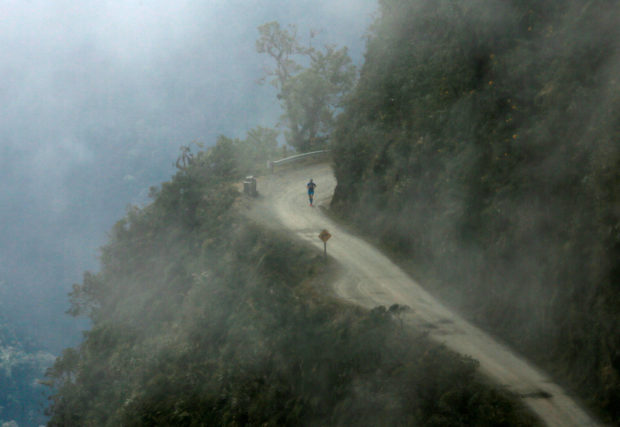Bolivia’s ‘Death Road’ once haunted drivers. Now it’s a wildlife haven

A competitor runs during the Bolivia Sky Race on the “Death Road” from Yolosa to Chuspipata, near La Paz, Bolivia, July 29, 2018. REUTERS FILE PHOTO
LOS YUNGAS, Bolivia — Bolivia’s decision to open an alternate route to its historic ‘Death Road’ – a serpentine dirt path across the towering Andes hills known for its deadly cliffs – has led to a resurgence of wildlife in the area, according to an environmental group.
The route was once a key road frequented by heavy trucks connecting Bolivia’s capital La Paz to the country’s Amazon rainforest. But its deadliness earned it the nickame the ‘Death Road.’ Between 1999 and 2003 hundreds of Bolivians died trying to navigate it.
By 2007, Bolivia opened an alternate route, leaving the original road as mostly an attraction for cyclists. That not only saved lives but also helped nature, according to a new study by the Wildlife Conservation Society (WCS).
“The fauna, when this road was still functioning, it was being affected by the pollution that vehicles generated, the noise and dust,” said Maria Viscarra, a biologist who participated in the study.
The WCS set up 35 camera traps along the route and found 16 species of mammals and 94 species of wild birds.
Article continues after this advertisement“Today, heavy haul trucks don’t go through this road anymore. Biodiversity has come back to the area and you can see birds like hummingbirds, toucans, parrots,” said Guido Ayala, a biologist with the WCS.
Article continues after this advertisementWhile the road is no longer used by many drivers, the route is still dotted with crosses, a way to memorialize those who died on its path.
“It is so nice that we have a place close to the (capital) La Paz, some 50 minutes away, where one can come and see nature in a beautiful way,” Ayala added.
RELATED STORIES
Bolivia’s Lake Poopo dries up and scientists fear refill unlikely
Glass frogs reappear in Bolivia after 18 years
Bolivia’s jaguars facing threat from Chinese fang craze
LOOK: No traffic, great view with Bolivia’s colorful cable car system